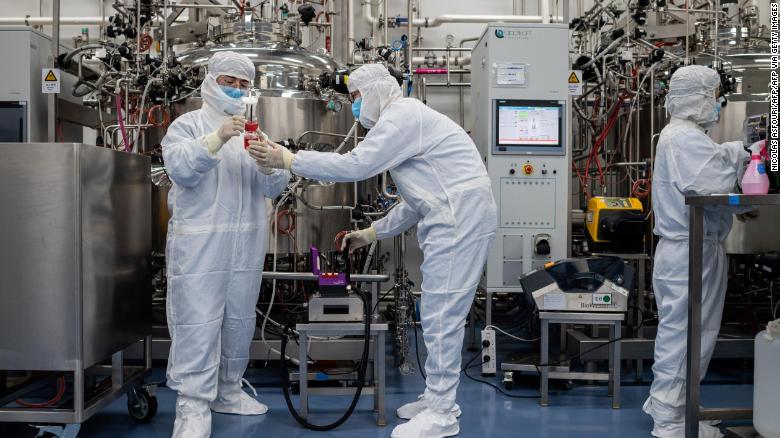2020/8/27 9:53:36
Inside the white, sterile walls of a new building on the southern outskirts of Beijing, two employees donning masks and rubber gloves are busy pipetting a clear, colorless liquid into rows of small vials. CoronaVac, the vaccine candidate from Sinovac, is part of China's push to be at the forefront of rolling out immunizations against the deadly novel coronavirus -- and to demonstrate its scientific prowess. CoronaVac, a Covid-19 vaccine candidate produced by Sinovac Biotech, is one of the six vaccines worldwide that have entered Phase 3 clinical trials. Scientists globally are racing to find a way to stop to the virus that has infected more than 23 million people and claimed over 800,000 lives. Six vaccine candidates have started Phase 3 clinical trials -- the last step of testing to prove efficacy and safety before seeking approval from regulators -- and three are Chinese. CaronaVac uses an old-fashioned approach -- employing an inactivated whole virus to prompt the body to develop immunity. The virus is grown under controlled conditions and killed chemically, so it cannot replicate to cause disease when injected into the body. This method has long been proven effective with other viruses, and is still used in polio and flu shots, as well as the rabies vaccine.
In some areas, the interior fit-out is still underway. Outside, construction vehicles are digging up dirt.
The 215,000 square feet (20,000 square meter) production plant was built in recent months specifically for producing a Covid-19 vaccine developed by Chinese pharmaceutical company Sinovac Biotech.
CoronaVac's last-stage trials are being rolled out in Brazil and Indonesia with about 11,000 volunteers.
"If everything goes well, we hope that we can have some results around the end of the year," said Helen Yang, director of investor relations at Sinovac, from the CaronaVac production plant in the Chinese capital's Daxing district.
The Nasdaq-listed biotech company began developing its vaccine in late January, less than a week after Wuhan -- the original epicenter of China's coronavirus outbreak -- went into a strict lockdown. Construction of the plant started in March, and Yang said the facility will eventually produce 300 million doses of the vaccine a year, if it is approved by China's National Medical Products Administration.
Engineers work on monkey kidney cells for an experimental Covid-19 vaccine at the Sinovac Biotech facilities in Beijing on April 29.
A Sinovac spokesperson said the company chose an inactivated vaccine because it was most familiar with this approach.
The US is pushing ahead with a newer type of vaccine made using genetic material from the virus. This type of vaccine is faster to produce, because whole samples of a virus do not have to be cultured, but there is less known about which genetic material to choose from the virus to replicate to induce an strong immune response.
To fast-track the preclinical process -- where researchers develop the vaccine candidate and test it on animals -- Yang said the company had conducted several studies in parallel so it could select the best results.
Sinovac has also been working closely with China's equivalent of the Food and Drug Administration to speed up the approval process. "Once we complete a certain study, we submit the data ... immediately so they can start to review," Yang added.
In May, Sinovac published in the journal Science the results of animal trials, which found that its vaccine induced effective antibodies in mice and rats, as well as primates such as the rhesus macaques. A month later, the company said its Phase 2 trial of 600 volunteers found the vaccine caused the human body to produce antibodies 14 days after vaccination.
But the Phrase 3 trial requires large-scale testing of thousands of participants.
By June, China had largely contained the coronavirus, contending with only small, sporadic outbreaks. China had reported 84,996 Covid-19 cases by Wednesday, with fewer than 2,000 new infections since the start of June -- and more than a third of those were imported, according to the country's National Health Commission (NHC).
Yang said the small number of newly reported Covid-19 cases in China didn't meet the necessary conditions for a Phase 3 trial, so Sinovac reached an agreement with Brazil -- which ranks second in the world for infections, with more than 3.6 million reported cases.
In collaboration with the Butantan Institute in São Paulo, a Phase 3 study was launched in late July involving 9,000 volunteers, all health professionals who have worked with Covid-19 patients but haven't been infected with the virus, according to São Paulo officials.
In exchange, Brazil was promised 120 million doses of the vaccine, if the tests found it to be effective.
The tests are ongoing, but Dimas Covas, president of the Butantan Institute, said Wednesday preliminary data shows CoronaVac induced immunity in 97% of the people vaccinated after two doses -- a level he said was "fundamental to break the chain of transmission of the coronavirus."
Covas said earlier this month that data on the efficacy of the vaccine could be available by October -- potentially starting the formal approval process in a matter of months. He expects the vaccine to be available to the Brazilian public by January.
"I am very optimistic. I think it would be a reasonable time frame given the performance so far," he said at a public hearing at the Brazilian Chamber of Deputies.
This month, Sinovac also rolled out another Phase 3 trial in Indonesia with 1,620 volunteers. Indonesia's state-owned Bio Farma said in a statement Friday that it signed a preliminary agreement with Sinovac for the bulk purchase of 50 million vaccines from November to March 2021, with guaranteed priority access until the end of next year.
(From admin)